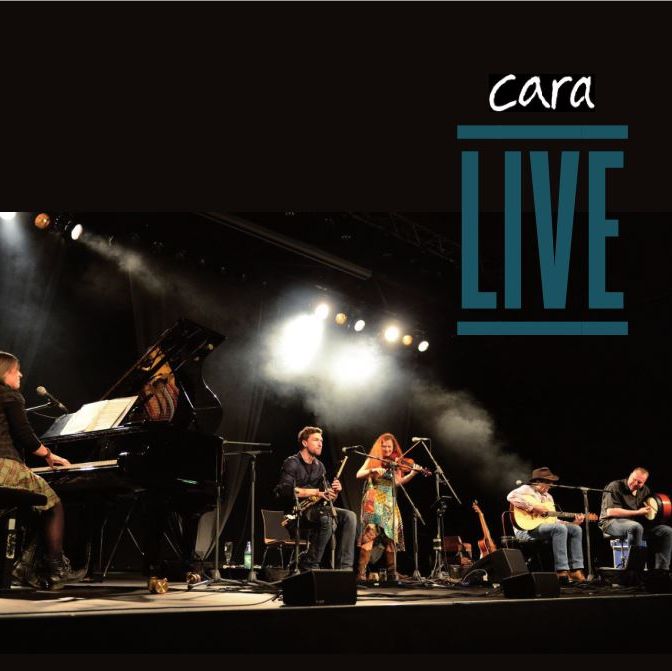

Songs That Made History: German-Irish band CARA celebrates its 15th anniversary in 2018. By happenstance, the jubilee live album features three traditional ballads that Mr Francis James Child had already collected and published in his voluminous 19th century anthology, The English and Scottish Popular Ballads.
"The Twa Magicians", "The Two Magicians", "The Lady and the Blacksmith", or "The Coal Black Smith" (Roud 1350, Child 44) is a British folk song. It first appears in print in 1828 in two sources, Peter Buchan's Ancient Ballads and Songs of the North of Scotland and John Wilson's Noctes Ambrosianae #40. It was later published as number 44 of Francis James Child's English and Scottish Popular Ballads. During the 20th century, versions of it have been recorded by a number of folk and popular musicians.
A blacksmith threatens to deflower (take the virginity of) a lady, who vows to keep herself a maiden. A transformation chase ensues, differing in several variants, but containing such things as she becomes a hare, and he catches her as greyhound, she became a duck and he became either a water dog or a drake. In the Child version of the ballad she does not escape, but in other common renderings, she does.
In ballads, the man chasing the woman appears more often in conversation that in fact, when a woman says she will flee, and the man retorts he will chase her, through a variety of forms; these tales are often graceful teasing.
Francis James Child regarded it as derived from one of two fairy tale forms.
In the first, a young man and woman flee an enemy by taking on new forms. This type is Aarne-Thompson type 313, the girl helps the hero flee; instances of it include "Jean, the Soldier, and Eulalie, the Devil's Daughter", "The Grateful Prince", "Foundling-Bird", and "The Two Kings' Children".
In the second, a young man, studying with a sorcerer, flees his master by taking on new forms, which his master counters by equivalent forms. This is Aarne-Thompson type 325, the magician and his pupil; instances include "The Thief and His Master", "Farmer Weathersky", "Master and Pupil", and "Maestro Lattantio and His Apprentice Dionigi".
The Roud Folksong Index lists 33 examples. though some are duplicates. Apart from earlier Scottish versions there are eight versions collected in the 20th and 21st centuries, five from England, three from Scotland, and one from Kentucky. The earliest was collected by Cecil Sharp in 1905.
The song has been recorded (generally under the name "The Two Magicians") by a number of traditional folk artists, including A. L. Lloyd, Ewan MacColl, Martin Carthy, Dave Swarbrick, and John Roberts, as well as folk rock and folk jazz artists such as Galley Beggar, Steeleye Span, Spriguns of Tolgus, Pentangle, and Bellowhead. It is also popular among neofolk artists, and has been recorded by Current 93 (under the name "Oh Coal Black Smith") and Blood Axis.
Listen to Twa Magicians from: Martin Carthy & Dave Swarbrick, Greg Russell & Ciaran Algar, Greg Russell & Ciaran Algar (live), Steeleye Span, Steeleye Span (live)
Watch Twa Magicians from: Bellowhead, Celtic Stone, Damh The Bard, Bob Fox & Stu Luckley, Lady Maisery, Gareth Scott, Steeleye Span, Vicki Swan & Jonny Dyer
"Matty Groves" is a Border ballad probably originating in Northern England that describes an adulterous tryst between a man and a woman that is ended when the woman's husband discovers and kills them. This song exists in many textual variants and has several variant names. The song dates to at least the 17th century, and under the title Little Musgrave and Lady Barnard is one of the Child Ballads collected by 19th-century American scholar Francis James Child.
Little Musgrave (or Matty Groves, Little Matthew Grew and other variations) goes to church on a holy day either "the holy word to hear" or "to see fair ladies there". He sees Lord Barnard's wife, the fairest lady there, and realises that she is attracted to him. She invites him to spend the night with her, and he agrees when she tells him her husband is away from home. Her page goes to find Lord Barnard (Arnel, Daniel, Arnold, Donald, Darnell, Darlington) and tells him that Musgrave is in bed with his wife. Lord Barnard promises the page a large reward if he is telling the truth and to hang him if he is lying. Lord Barnard and his men ride to his home, where he surprises the lovers in bed. Lord Barnard tells Musgrave to dress because he doesn't want to be accused of killing a naked man. Musgrave says he dare not because he has no weapon, and Lord Barnard gives him the better of two swords. In the subsequent duel Little Musgrave wounds Lord Barnard, who then kills him. Lord Barnard then asks his wife whether she still prefers Little Musgrave to him and when she says she would prefer a kiss from the dead man's lips to her husband and all his kin, he kills her. He then says he regrets what he has done and orders the lovers to be buried in a single grave, with the lady at the top because "she came of the better kin". In some versions Barnard is hanged, or kills himself, or finds his own infant son dead in his wife's body. Many versions omit one or more parts of the story.
The name Musgrave originates in Westmoreland, a former county in the north of England now part of Cumbria.
Some versions of the ballad include elements of an alba, a poetic form in which lovers part after spending a night together.
There are few broadside versions. There are three different printings in the Bodleian Library's Broadside Ballads Online, all dating from the second half of the seventeenth century. One, The lamentable Ditty of the little Mousgrove, and the Lady Barnet from the collection of Anthony Wood, has a handwritten note by Wood on the reverse stating that "the protagonists were alive in 1543".
Child published 14 examples.
The Roud Folk Song Index contains 302 instances of this ballad, and shows that the ballad has been collected mostly in North America: 113 versions listed in Roud were found in the USA, with the bulk in North Carolina (24), the Virginias (24), Kentucky (23), New England (16) and Tennessee (9). In Canada, 18 versions were found, the majority in Nova Scotia. Scotland produced 9 versions, and England only 2. Cecil Sharp is listed as the collector for 22 of the versions.
A number of songs and tales collected in the Caribbean are based on, or refer to, the ballad.
| Variant | Lord/Lady's surname | Lover |
|---|---|---|
| The Old ballad of Little Musgrave and the Lady Barnard | Barnard | Little Musgrave |
| Mattie Groves | Arlen | Little Mattie Groves |
| Matty Groves | Darnell | Matty Groves |
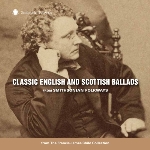
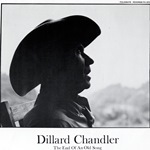
Some of the versions of the song subsequently recorded differ from Child's catalogued version. The earliest published version appeared in 1658 (see Literature section below). A copy was also printed on a broadside by Henry Gosson, who is said to have printed between 1607 and 1641. Some variation occurs in where Matty is first seen; sometimes at church, sometimes playing ball.
Matty Groves also shares some mid-song stanzas with the ballad "Fair Margaret and Sweet William" (Child 74, Roud 253).
Other names for the ballad:
There is an allusion to the ballad in Beaumont and Fletcher's play The Knight of the Burning Pestle (1613); this is the earliest known reference.
Al Hine's 1961 novel Lord Love a Duck opens and closes with excerpts from the ballad, and borrows the names Musgrave and Barnard for two characters.
Deborah Grabien's third book in the Haunted Ballad series, Matty Groves (2005), puts a different spin on the ballad.
In the film Songcatcher (2000), the song is performed by Emmy Rossum and Janet McTeer.
In season 5 episode 2, "Gently with Class" (2012), of the British television series Inspector George Gently, the song is performed by Ebony Buckle, playing the role of singer Ellen Mallam in that episode, singing it as "Matty Groves".
In 1943, the English composer Benjamin Britten used this folk song as the basis of a choral piece entitled "The Ballad of Little Musgrave and Lady Barnard".
The Big Musgrave, a parody by the Kipper Family appears on their LP Fresh Yesterday (DAM CD 020) (1988). The hero in this version is called Big Fatty Groves.
Frank Hayes created a talking blues version of Matty Groves called "Like A Lamb To The Slaughter," which won the 1994 Pegasus award for "Best Risqué Song."
Listen to Matty Groves (Little Musgrave) from: Cara, Conor Doherty, Fairport Convention, Fairport Convention, Linde Nijland, Planxty, Lissa Schneckenburger, Martin Simpson, Martin Simpson (live), Deirdre Starr, Hedy West
Watch Matty Groves (Little Musgrave) from: Eva Abraham, Bill Callahan, Conor Doherty, Fairport Convention, John Wesley Harding, Nic Jones, Jimmy Kelly, The Kennedys, Kirsty Leonard, Christy Moore, Planxty, Martin Simpson, Strangelings

»I find the ballad intensely tragic because its characters knowingly pursue ruin by insisting on unbending truthfulness.« (Hedy West) 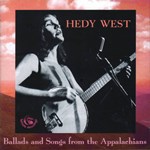 Hedy West @ FROG |
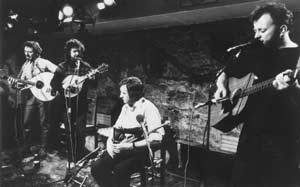
»I was first drawn to this song by its length. The first verse appealed to me because I too went to Mass to look at girls.« (Christy Moore)  Planxty @ FROG |
The Lass of Roch Royal (Roud 49) is Child ballad number 76, existing in several variants.
A woman comes to Gregory's castle, pleading to be let in; she is either pregnant or with a newborn son. His mother turns her away; sometimes she tells her that he went to sea, and she goes to follow him and dies in shipwreck. Gregory wakes and says he dreamed of her. He chases her, finds her body, and dies.
Alternate titles of "The Lass of Roch Royal" include "Lord Gregory", "Fair Anny", "Oh Open the Door Lord Gregory", "The Lass of Loch Royal" "The Lass of Ocram", and "Mirk Mirk".
The New-Slain Knight has, in some variants, verses identical to those of some variants of The Lass of Roch Royal, where the woman laments her baby's lack of a father.
Also Child ballad number 216 ("The Mother's Malison") is almost identical to "The Lass of Roch Royal" only in a reversed manner, telling the story of a young man looking for his beloved.
The Northamptonshire poet John Clare wrote a poem "The Maid Of Ocram, Or, Lord Gregory" presumably based on an Irish version of the ballad. Clare was influenced by Gypsy travellers and may have heard folk songs and ballads from them.
"The Lass of Aughrim," an Irish version of "The Lass of Roch Royal," figures prominently in the story "The Dead" by James Joyce.
This ballad was printed as a broadside ballad under the title "The lass of Ocram". J Pitts of Seven Dials, London published it sometime between 1819 and 1844. It was also published by Catnach, also of London, and Collard of Bristol.
The Roud Folk Song Index lists 12 versions collected from traditional singers from Scotland, 4 from Ireland, 1 from Canada and a massive 82 from the USA, with 30 from Virginia. However, many of these are based on the "Who's gonna shoe your pretty little foot, who's gonna glove your hand" motif. For example, the version listed for Charlie Poole, entitled "When I'm Far Away" from North Carolina goes as follows:
Who's gonna smoke the old clay pipe? x3
When I am far away
followed by
Who's gonna be your little man?
Who's gonna glove your little hand?
Who's gonna shoe your little foot?
Who's gonna kiss your little lips?
There are longer versions, notably Jean Ritchie's "Fair Annie of Lochroyan", which fairly accurately tells the story, ending with a quatrain:
Then he took out a little dart
That hung down by his side
And thrust it through and through his heart
And then fell down and died.
There are recordings of 7 versions on the Tobar an Dualchais/Kist of Riches website—three by Scottish traveller Charlotte Higgins, and one each by John McEvoy, a 13-year-old Isla St Clair, Stanley Robertson and Cathal O'Connell.
There is a version by Irish singer Elizabeth Cronin on the Cultural Equity website.
Listen to The Lass of Roch Royal (Lord Gregory) from: Cara, Jane Cassidy, Danú, Orion, Sliotar
Watch The Lass of Roch Royal (Lord Gregory) from: Cara, The Corries, Jesse Ferguson, Janene M, Fiona Kelleher, Kathryn Roberts & Sean Lakeman, Samhradh Music

Text is available under the Creative Commons Attribution-ShareAlike License.
Date: February 2018.
Photo Credits:
(1)-(2) Cara,
(3) Martin Carthy,
(5) Steeleye Span,
(6) Greg Russell & Ciaran Algar,
(7) Fairport Convention,
(8) "Classic English and Scottish Ballads from Smithsonian Folkways (from The Francis James Child Collection)",
(9) "Dillard Chandler: The End of an Old Song",
(12) Hedy West,
(13) Planxty,
(14) Danu,
(15) Sliotar
(unknown/website);
(4) "The Twa Magicians",
(11) "Matty Groves",
(16) "The Lass of Roch Royal"
(by folkinfo.org);
(10) Martin Simpson
(by Walkin' Tom).